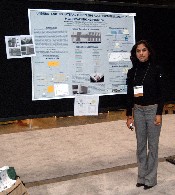|
December 10, 2005
Math and Alma Garcia have been a good fit ever since
she mastered calculating square roots in the fourth
grade. By age 12, she had set her sights on becoming an
architect. 
Today, the 23-year-old architectural engineering
student at Allan Hancock College is the recipient of a
top award from a national science conference after she
and 29 other winners beat out more than 500 college
students, from the community college to university
graduate level.
Garcia won the award this fall for her project,
“Understanding the Lateral Tunneling Accelerometer and
the Micromachining Process,” a research poster
presentation in engineering she delivered at the Society
for the Advancement of Chicanos and Native Americans in
Science (SACNAS) National Conference in Austin,
Texas.
Garcia’s project was the culmination of an internship
she completed this summer at the University of
California at Santa Barbara through the Internships in
Science, Engineering and Technology (INSET) program,
sponsored by the National Science Foundation. She worked
under the mentorship of Assistant Professor Dr. Kimberly
Turner and graduate student Laura Oropeza-Ramos, both
with UCSB’s Department of Mechanical and Environmental
Engineering.
The INSET program brings science and engineering
community college students to UCSB for a summer research
experience where they are provided laboratory training
and professional development at the California
NanoSystems Institute.
For Garcia, the choice to major in architectural
engineering was a natural. “I love designing things,”
she said simply. A native of Mexico, Garcia moved to
California in 1998 knowing little English. She was
placed in 10th grade at Santa Maria High School where
she graduated in 2001.
At first, Garcia chose to major in architecture, but
switched majors once she learned that architectural
engineering required the mathematics courses she craved,
including a full series of calculus and physics. “Oh,
this is the major I want,” she said, expressing her
delight at finding just the right fit.
Through a lot of hard work and help from Allan
Hancock College’s Mathematics, Engineering and Science
Achievement Community College Program (MESA CCP), Garcia
has achieved tremendous success in a demanding
discipline. She plans to attend Cal Poly, San Luis
Obispo, next fall, where she will pursue a bachelor¹s
degree in architectural engineering. Then it’s on to
graduate school.
For now, Garcia is on the Hancock campus from 9 a.m.
to 9 p.m. every day, where she can be found in the
classroom, library or at the MESA Center. She is also a
tutor at the MESA Center where she helps other students
master math, physics and sometimes chemistry.
Garcia was one of seven students who attended the
SACNAS conference along with Hancock faculty. The annual
conference brings together students, faculty researchers
and exhibitors from around the world for workshops and
presentations on cutting-edge research and trends in
sciences.
Other Hancock students who attended the SACNAS
conference were mechanical engineering majors Oscar
Vargas, Ricardo Garcia, Ranulfo Morales and Erik
Sanchez; civil engineering major Alex Ubaldo; and
mathematics major Barbara Kelly.
Garcia said she doesn’t think she could have pursued
a career in architectural engineering without Hancock’s
MESA Program. “MESA helps me with all the tools needed,
such as books, calculator, tutors, computers and the
great inspiration from Julie,” Garcia said, referring to
the program’s interim director, Julie Niles, who
encouraged Garcia to apply for the INSET program. “Julie
helps every member in an incredible way to achieve
success.”
As the director, Niles oversees an array of programs
and activities. According to Niles, “Our goal is to
provide academic support and professional development
for financially and educationally disadvantaged students
who are seeking to transfer to four-year universities in
math-based majors.”
Niles emphasized that at Hancock, it’s not enough
simply to prepare students for transfer to four-year
universities. Since the community college is situated
between two highly selective universities for math,
science and engineering majors, Cal Poly and UCSB, “one
of our goals in MESA is to prepare students for the
rigors of a highly competitive university environment,”
she said.
To achieve this goal, the MESA program offers
students a variety of professional development
opportunities, including industry field trips, guest
speakers, leadership and science conferences, as well as
mentoring. All of these educational options expose
students to the climate and culture of the industries
they will be entering, Niles added.
The daughter of field workers and a first-generation
college student, Garcia said she also receives a lot of
help and encouragement from her family. Her older
brother even helps her financially while her younger
brother lets her drive his car to school. “My parents
are very supportive,” she said. “They always tell me to
keep going and to do my best.”
- AHC -
Written by Sally
Jackoway |